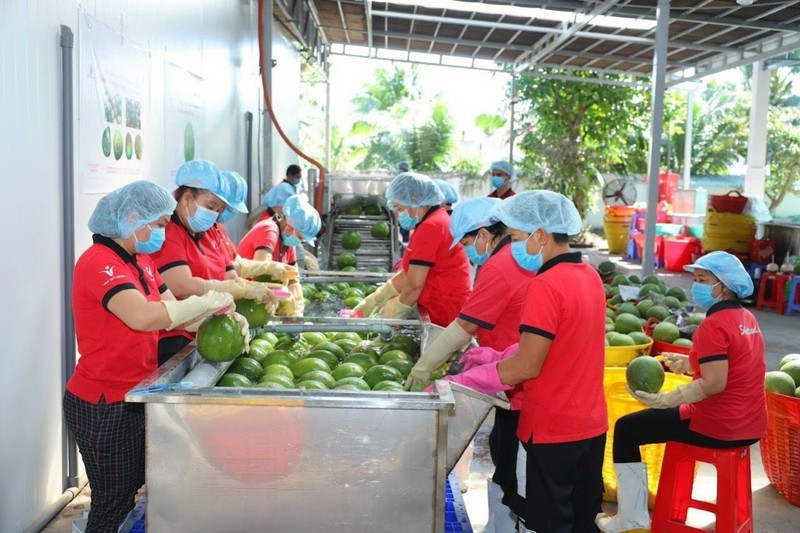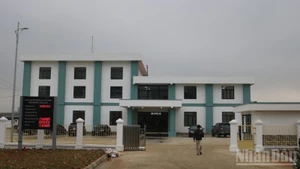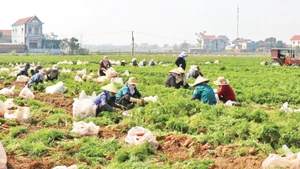To Ngoc Son, Deputy Director of the Asia-Africa Market Department (the Ministry of Industry and Trade), said that China is the leading important market and the number one trading partner of Vietnam. Import-export turnover between Vietnam and China reached 175.5 billion USD in 2022, accounting for 24% of Vietnam’s total import-export revenue.
Regarding the agricultural sector, China is the largest export market of Vietnamese vegetables and fruits (accounting for 53.7% of the total), cassava and cassava products (91.47%), and rubber (71%). China is also the third largest export market of Vietnamese seafood (after the US and Japan).
The leading important market
The China Customs has so far granted 2,492 product codes to enterprises producing and processing agricultural products in Vietnam, more than 2,000 codes for growing areas and 1,438 codes for packing establishments for agricultural products for export to the Chinese market. China has opened its border on January 8, 2023, after a period of limited trade due to the COVID-19 pandemic, so agricultural export activities between the two countries have become more active.
According to Lao Cai Border Gate Management Board, the total import and export value through Lao Cai Border Gate reached nearly 82 million USD in January 2023. As many as 6,713 vehicles carrying agricultural products were handled through the Kim Thanh II International Border Gate in January 2023, with a total import and export value of nearly 59 million USD.
Exports are mainly fresh agricultural products such as dragon fruit, banana, watermelon, rambutan, and jackfruit. In January 2023, nearly 600 trucks of dragon fruit were brought to Lao Cai for export to China. More than 800 trucks of agricultural products are cleared in Lang Son Province every day.
Deputy Director of Plant Protection Department, Huynh Tan Dat said that the positive export signals from the beginning of this year were partly due to the phytosanitary protocols signed between the two countries regarding agricultural products, including: banana, durian, mangosteen, black jelly, rice bran and rice. The Department is negotiating with the Chinese side to sign a protocol on the official export of some traditional fresh fruits such as watermelon, dragon fruit, mango, jackfruit, longan, lychee, and rambutan. The two countries are also negotiating techniques for the official export of medicinal herbs, pomelos, some citrus fruits, and coconuts.
Focusing on exploiting key products
Deputy General Director of Dong Giao Foodstuff Export Joint Stock Company (DOVECO) Pham Ngoc Thanh said that the company’s export of agricultural products to the Chinese market in 2022 posted a growth rate of 130% compared to 2021 thanks to a focus on key products such as: fresh passion fruit, processed passion fruit, passion fruit juice, and banana products. In addition to fresh fruits, DOVECO is also focusing on deep processing to improve the added value of products.
Pham Ngoc Thanh said that it is very important to promote, advertise and introduce products to Chinese partners, including the active participation in trade fairs in China to promote the export of vegetables and fruits to the market. It is the fastest way for Chinese consumers to access Vietnamese agricultural products. As such, DOVECO wishes the authorities to continue to create conditions for Vietnamese businesses to participate in product and trade promotion programmes in the future.
 |
| Seafood is a potential export item to the Chinese market. (Photo: LE HOANG VU) |
Dr. Tra My, President of the provisional Vietnam Business Association in China, emphasised that enterprises need to pay attention to product quality and have a branding plan for agricultural products which have great effect on the selling price of products. Enterprises should also focus on exporting via sea thanks to many advantages over focusing on road transport at present.
For the promotion of products, the provisional Vietnam Business Association in China has invested in establishing a Vietnamese booth in China, helping businesses display preliminarily processed and finished products for free. In the coming time, the provisional Vietnamese Business Association in China will coordinate with other agencies to organise the first Vietnam-Shanghai investment and trade forum, scheduled for April 2023, focusing on the export of Vietnamese agricultural products to China.
Deputy Minister of Agriculture and Rural Development Tran Thanh Nam said that China’s reopening of the border from January 8, 2023 is good news for businesses of the two countries, but without improvements to the quality and product design and cost reduction, Vietnamese enterprises will still face many challenges.
Therefore, enterprises need to strictly comply with the technical requirements and combine with local agricultural agencies to build raw material areas, in addition to coordinating with packing facilities and agencies specialising in granting planting area codes to meet requirements from the Chinese market. Businesses should actively contact with agencies such as the border gate management board to obtain information on the progress of customs clearance to avoid congestion and ensure the quality of agricultural products, customs clearance time and transport costs.
















